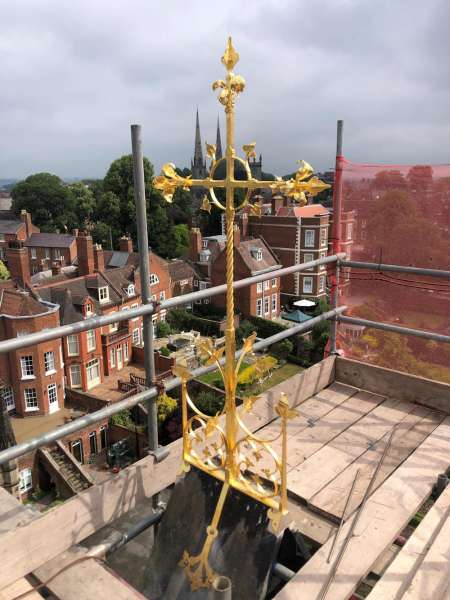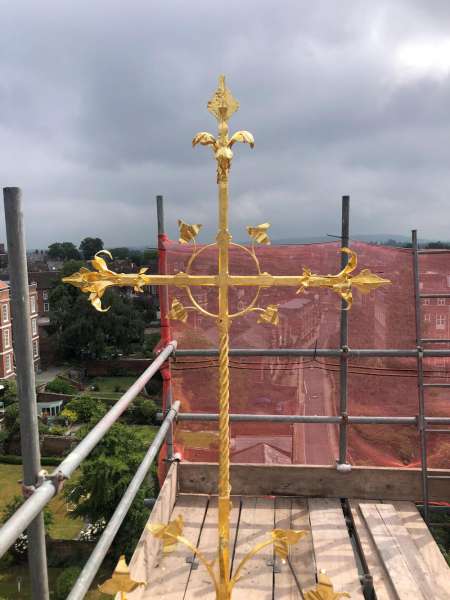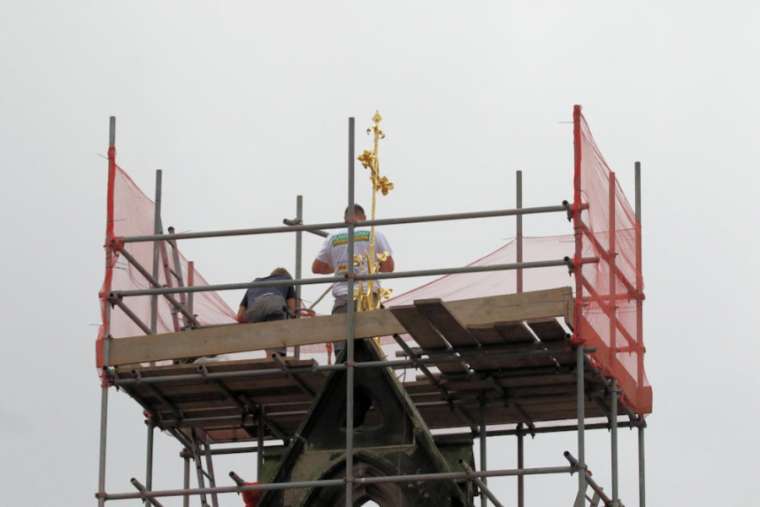Bishop Davies has hailed the restoration of a cross atop his cathedral as “a sign of hope” amid the coronavirus pandemic.
Bishop Mark Davies of Shrewsbury said: “In this year of global pandemic, it seems especially appropriate to see the cathedral cross restored as the sign of hope in the victory of life and love. Raised high above the cathedral, this cross that will continue to shine on the skyline of Shrewsbury for generations to come.”
The wrought iron cross was installed at the Cathedral Church of Our Lady Help of Christians and St. Peter of Alcantara, Shrewbury, in 1856, the year the cathedral opened.
According to Shrewsbury diocese, the cross is an early example of the work of the Arts and Crafts movement, which was inspired in part by the ideas of architect Augustus Pugin, who designed the cathedral located in the county of Shropshire.

The diocese said the cross was in “dire need” of restoration due to rust and other damage. The conservation specialist M. Salt Limited removed the cross for the first time since its installation, repairing it and repainting it. It was restored to the cathedral’s bell tower the day that Catholic churches in England were permitted to reopen for private prayer following the coronavirus lockdown.
In a press statement, the diocese said: “There is no documentary evidence to show who designed and commissioned the cross though architects suspect it was AW Pugin’s son, Edward, who took the responsibility to finish the cathedral after the death of his father in 1852.”
Conservation expert Mike Salt suggested that the wrought iron cross was inspired by Jean Tijou, a French Huguenot ironworker who made gates and railings for Hampton Court Palace, King Henry VIII’s favorite palace.
The body of the cathedral cross is made of wrought iron with charcoal iron used to form ornate leaves. Salt said the use of charcoal iron indicated the cross was made using the repoussé technique associated with Tijou, in which metal is shaped by hammering from the reverse side.
Salt said: “In my mind, therefore, the cross is historically important not only because it demonstrates the best in the [Arts and Crafts] movement, but also because it demonstrated that it was still possible to reproduce Tijou’s work in a modern environment. I would like to think that its repair and conservation has continued that theme.”

The work on the cross is part of an ambitious restoration project at the cathedral, which is one of the smallest in England.
Davies, who became the 11th bishop of Shrewsbury in 2010, has brought the Tabernacle back to the center of the cathedral. He has also obtained permission to remove wooden platforming that created an extended sanctuary in 1980s.
Writing in the Catholic Herald in 2019, Davies said: “The new cathedrals of England were built to create sacred space for the people of our land. In Shrewsbury, we are seeking to renew this mission so that our cathedral may continue to present the vision of the Catholic faith to new generations who might know little of its beauty.”
“This mission is ultimately to lead us to recognise Jesus Christ truly present in the mystery and reality of the Eucharist.”

